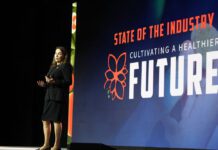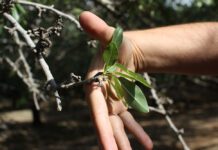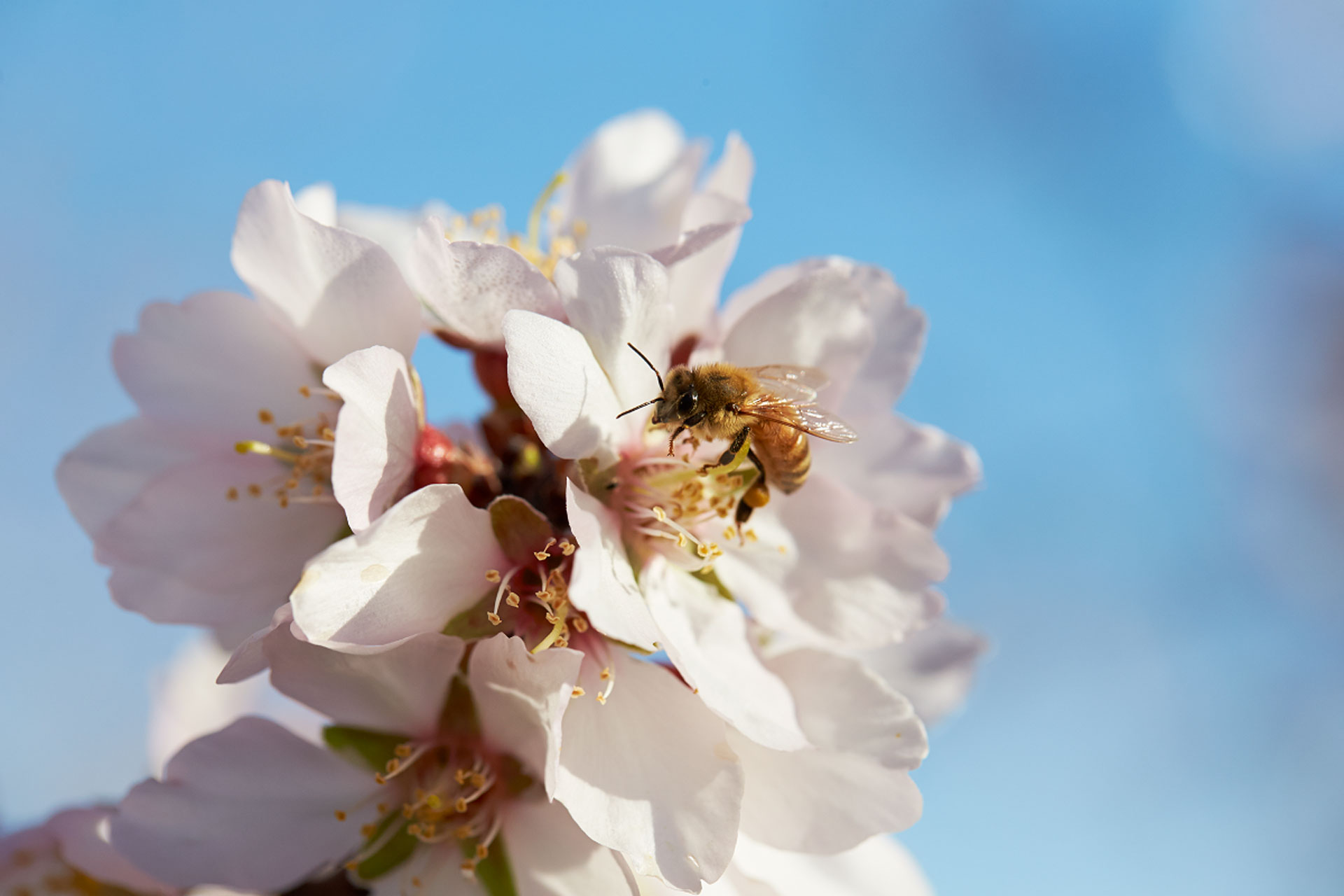
The past October, the North American Pollinator Protection Campaign (NAPPC) presented its Business for Bees Sustainability Award, an honor reserved for standout organizations that go above and beyond to support pollinators, to the Almond Board of California (ABC) and the state’s almond farmers.
“This is about their long-term dedication to supporting all pollinators in their orchards and throughout our ecosystem,” said Kelly Rourke, executive director of Pollinator Partnership, which founded NAPPC 21 years ago. “We’ve worked with them for many years, and this is well-deserved recognition of their steadfast commitment to engaging farmers in pollinator conservation on multiple levels. The Almond Board and the entire almond industry have really moved the needle to raise awareness and generate action to protect pollinators.”
NAPPC has only given out its Business for Bees Sustainability Award once before. It is given in years when there is a business taking extra special steps to protect bees and all pollinators and to advance sustainability and innovation.
“ABC’s name is on this award, but it really goes to the 7,600 almond farmers in California,” said Josette Lewis, ABC’s chief scientific officer. “Farmers understand how important pollinators are to growing almonds and to all of agriculture and the environment. They want to be part of the solution.”
The reasons for the award, Rourke said, include ABC’s leadership in founding the California Pollinator Coalition (CPC), its work promoting on-farm pollinator habitat and its support of years of research and education about the best practices for providing hospitable environments for pollinators in almond orchards and in other habitats.
ABC worked with Pollinator Partnership and CDFA last spring to create the CPC, which brought together a broad array of grower organizations across the state’s ag and environmental landscape to help promote the health of wild and managed pollinators.
“The formation of the California Pollinator Coalition was such a big step,” said Laurie Davies Adams, Pollinator Partnership’s director of programs, who helped found the CPC. “This is a unique statewide coalition that brings together every grower, farmer and rancher group. I don’t think that’s ever happened before. It’s going to make a real difference on the ground.”
NAPPC is a collaboration of diverse partners from the U.S., Mexico and Canada. It includes respected scientists, researchers, businesspeople, conservationists and government officials. NAPPC works to promote awareness and scientific understanding of pollinators, to find common ground for solutions and to create innovative initiatives that benefit pollinators.
NAPPC is administered and supported by Pollinator Partnership, a non-profit headquartered in San Francisco with a mission to promote the health of pollinators through education, conservation and research.
The award was announced during NAPPC’s 21st-Annual International Conference, held virtually this year for the second time and hosted by the Pollinator Partnership and the Smithsonian National Museum of Natural History. The conference and award ceremony were planned for the Smithsonian before being forced to remain virtual because of COVID-19.
Rourke and Adams said they would have liked to have given the honor in person to show how much they appreciate ABC’s work.
“The strong effort that the Almond Board of California has mounted with the support of the almond industry to engage farmers and the entire agricultural community far beyond almond orchards is really impressive,” Adams said. “Bringing every grower group together to have an agriculturally led coalition for pollinators is significant. It will provide building blocks for even more engagement and large results. It’s a pioneering effort that other states are seeking to emulate.”
“This is an outstanding honor for our farmers,” Lewis said, “especially considering all the good work that NAPPC and the Pollinator Partnership do. As much as anyone, almond farmers are tuned in to the importance of pollinators to their crops and our ecosystem. That’s why they work so hard to make their orchards healthy places for pollinators.”
Almond farmers across California’s Central Valley sit in what is essentially a flyway for pollinators. In recent years, almond farmers have applied to certify more than 110,000 acres of Bee Friendly Farming®, providing pollinator habitat and integrated pest management across the valley to keep that flyway healthy and create badly needed floral resources that compliment and expand beyond the annual almond bloom.
“Almond farmers have doubled the number of acres of bee friendly habit in California and in that pollinator flyway,” Lewis said. “We’re proud to help lead a broad coalition of agriculture and conservation groups to work together to promote and preserve habitat for pollinators.”
About the California Pollinator Coalition
Spearheaded by ABC, the California Pollinator Coalition is a group of agricultural and conservation groups that will work to encourage more voluntary, grower-friendly efforts to protect the state’s native insect pollinators and managed honeybees.
The coalition includes a broad array of more than 20 of the state’s leading agricultural organizations and conservation groups. The Coalition will focus on increasing grower participation in projects to provide habitat and forage for pollinators and other beneficial insects across the state’s agricultural landscape.
“California’s almond industry has a long record of continuing improvement in the area of integrated pest management and protection and stewardship of managed bees,” said Lewis. “This new coalition helps us expand on our work to benefit California’s many native pollinator species. We’ll also get more results by collaborating within the agriculture and conservation communities on voluntary efforts that benefit both growers and the environment. Improving the health or our ecosystems is not something we can do alone, so we are glad to have many strong allies in this.”
Convened by Pollinator Partnership, the California Department of Food and Agriculture and the Almond Board of California, the Coalition’s goal is to increase habitat for pollinators on working lands to benefit biodiversity and food production through on-farm and in-orchard projects, supported by technical guidance, research and documenting progress toward increasing healthier pollinator habitats.
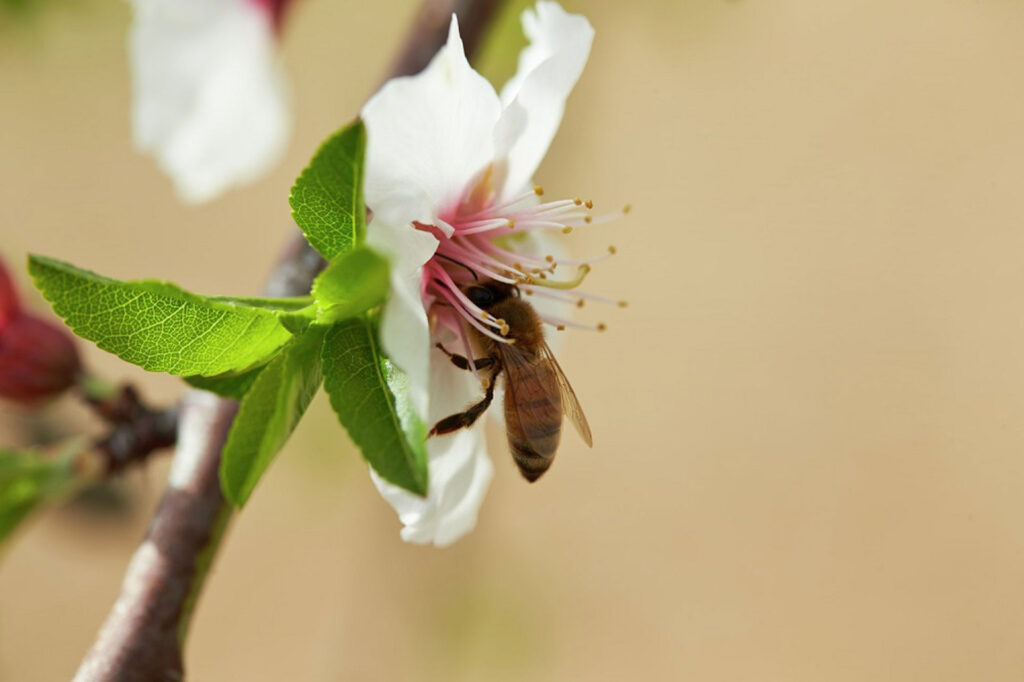
“What we are doing in California is acknowledging the urgency to address the critical issue of protecting all pollinators, including native and managed species,” said Adams. “Agriculture and conservation must work together to achieve this goal.
“The outcome will not be a tidy report that sits on a shelf, but rather a metric of acres, projects and species added to the landscape while agriculture continues to profitably feed the nation,” she said.
Extending the California almond industry’s commitment to protect honeybees during almond pollination, the Coalition plans to address habitat issues on an unprecedented scale for the benefit of the state’s beneficial insects, which include 1,600 species of native bees, managed honeybees, butterflies, beetles, wasps and more. Populations of many California pollinators are declining and often suffer from the same challenges as California’s agriculture.
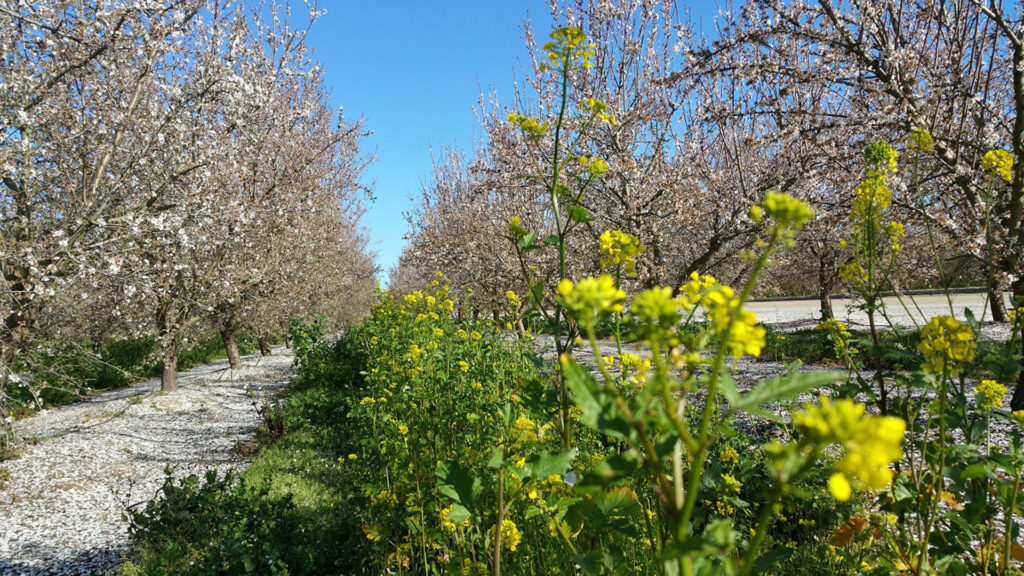
The Coalition will work together on a variety of fronts to support pollinators:
Prepare grower-friendly guidance to build and maintain pollinator habitat on farms and ranches
Conduct research and disseminating relevant science
Monitor outcomes (adoption rates and effectiveness of practices)
“Collaborative action can mitigate risks to California’s pollinators, and that’s exactly why this coalition has come together,” said Karen Ross, CDFA secretary of agriculture. “We need urgent action, yet the first step in the process is building trust that encourages, enables and enhances the result. The California Pollinator Coalition is a big step forward in a journey of grower and conservation groups voluntarily demonstrating leadership.”
“This will not be an easy or quick fix,” Lewis said. “It will require a robust and sustained effort, but we are determined to be part of the solution. Almond growers and many other farmers depend on pollinators to produce a crop and pollinators depend on us to provide safe habitat. Working lands can and should be part of the solution.”
“Farm Bureau supports voluntary, farmer-friendly efforts to improve habitat for native pollinators, and we have long advocated improved research on pollinator health,” said President of the California Farm Bureau Jamie Johansson. “We will work with the coalition for the benefit of native pollinators and managed bees, and to assure stability for the domestic bee business.”







